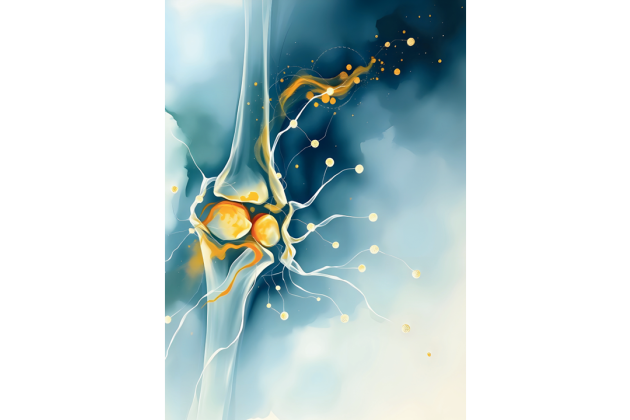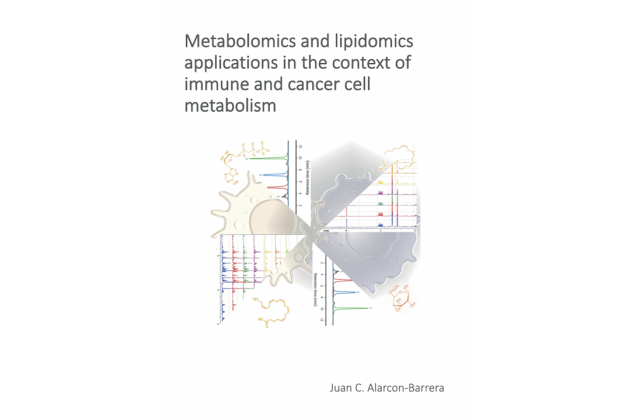Glycan analytics
Our goal is to continuously enhance the glycan-analytical toolbox to study glycosylation in an in-depth manner. Nano-liquid chromatography coupled to mass spectrometry (nanoLC-MS) and mass spectrometry imaging (MSI) are our key technologies.
For the detailed structural analysis of released glycans we rely on two high-end LC-MS platforms with either porous graphitized carbon (PGC)- or C18-nanoLC modules coupled to MS. Our workflows target N- and O-linked protein glycosylation from isolated proteins, cells and tissues, as well as glycosphingolipid (GSL) glycan headgroups. The described platforms allow for extensive isomer separation and as a result, lead to a comprehensive characterization of various glycosylation features that may be present in the samples of interest. By utilizing these analytical methods, we can gain valuable insights into the structural diversity and complexity of glycoconjugates.
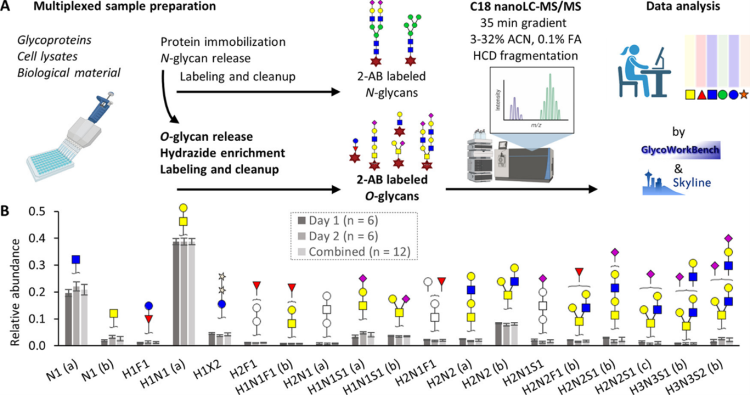
In-depth glycan profiling by C18-nanoLC-MS, Anal. Chem. 2022, 94, 10, 4343–4351.
Glycans never act independently, and the interplay between a glycan and its protein carrier is critical to understanding the role of glycosylation in biology as well as in exploiting glycosylation features as clinical targets for treatment and diagnosis. To focus on the protein carriers of the glycans we are advancing LC-MS-based glycoproteomic strategies for both N- and O-linked glycoproteins derived from cell surfaces and biofluids. Our newest approaches provide deep insights into the cell surface glycoproteome.
.png)
Cell surface N-glycoproteomics by LC-MS, Anal. Chem. 2023, 95, 47, 17328–17336
As sensitivity and cell-type specificity are key in glycomic analysis, we apply our unique MSI workflows to spatially characterize the distribution of N-glycans in tissues. This technique allows spatially resolved detection of hundreds of different N-glycan species within a tissue and allows us to discriminate between the biologically important sialic acid linkages.
TARGlycan
In the context of the Health~Holland TARGlycan project, we collaborate with Tacalyx GmbH (Berlin, Germany) to validate and develop cancer-specific glycan epitopes as treatment targets for colorectal cancer. We apply our tissue glycomic workflows to characterize different stages of colorectal cancer tissues and extend our research to other epithelial tissues. Furthermore, with our cell surface glycoproteomics approach, we aim to further define surface-specific cancer glycoproteins in epithelial cancers.
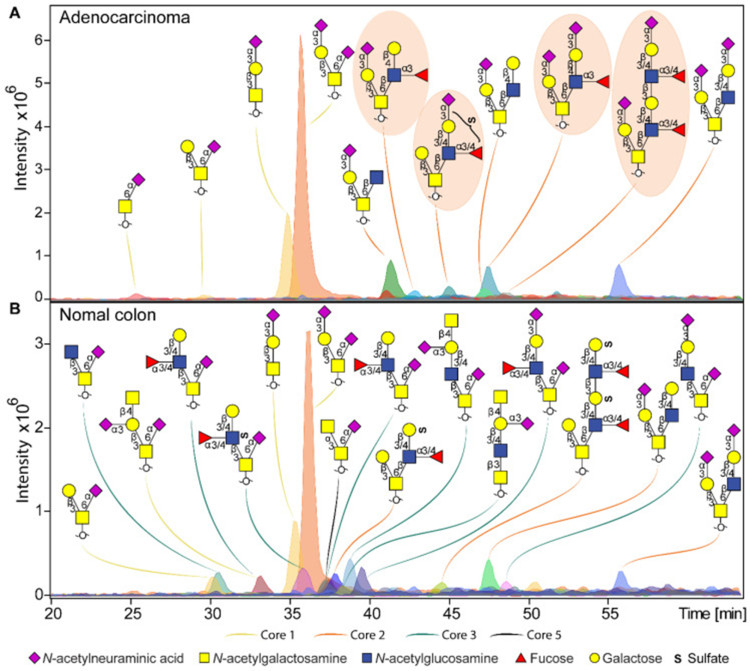
PGC-nanoLC-MS O-glycan profiling of colon carcinoma tissue, Theranostics. 2022; 12(10): 4498–4512.
GlycanTrigger
Within this large EU network, we work together with the researchers from the University of Porto, led by Prof. Salomé Pinho, to investigate how changes in glycosylation of the gut mucosa are an early trigger in the transition between healthy and inflamed tissue in inflammatory bowel diseases. For this project, we develop and apply the mass spectrometry imaging technology needed to spatially map the intestinal glycome.
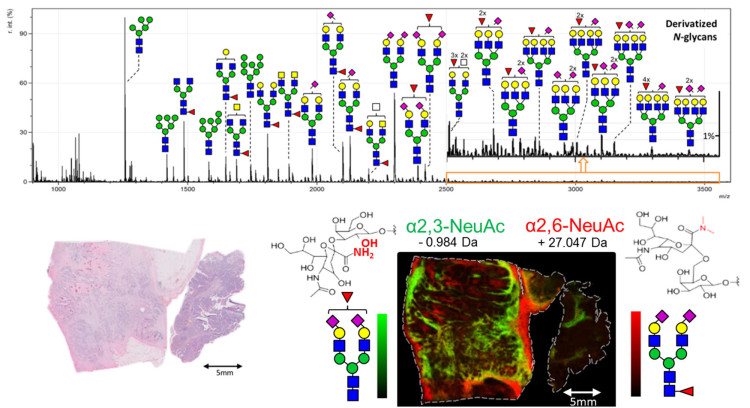
Glycan mass spectrometry imaging of a colon carcinoma FFPE tissue, Anal. Chem. 2016, 88, 11, 5904–5913
GlycoTwinning
In this EU twinning project, we collaborate with the researchers from NOVA University Lisbon, led by Prof. Paula Videira, to investigate the interactions between glycans, the microbiome and the development of colon cancer. In this project, we are developing and applying our glycan-analytical toolbox, with an important focus on the public availability of the tools and data, e.g. via web-based data visualization tools.
SPACETIME
The aim of the SPACETIME consortium (coordinated by Dr. Febe van Maldegem, VUmc Amsterdam) is to develop a spatial signature test for non-small cell lung cancer (NSCLC) patient stratification, to sidestep immunotherapy resistance, and to improve survival of NSCLC patients. Within this project we develop and apply the mass spectrometry imaging methodologies to analyze glycans, metabolites and lipids in lung tissue in an integrative manner. This is a close collaboration with the Metabolomics and Mass Spectrometry Imaging groups of CPM (Dr. Elena Sanchez Lopez and Dr. Nina Ogrinc).
Glycosylation in major non-communicable diseases
Blood and tissue glycans are heavily affected by metabolic health and lifestyle. Importantly, they associate with prevalent non-communicable diseases, such as gout, obesity, type 2 diabetes and steatotic liver diseases. We develop and apply glycomics and glycoproteomics strategies to investigate tissue (adipose, liver, muscle, colon) and plasma glycosylation as predictors of disease onset and as initiators of immune responses.
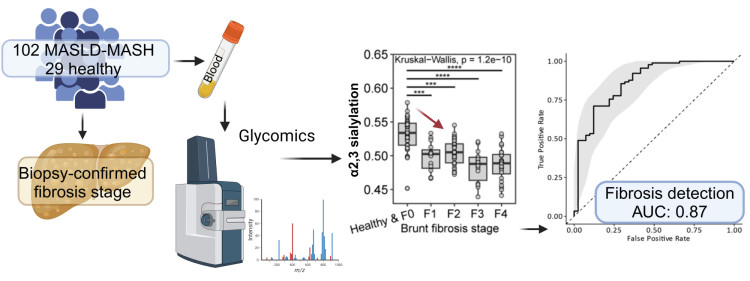
Blood glycomics marker for liver fibrosis in MASLD patients, medRxiv. 2024; 09.19.24313949.
